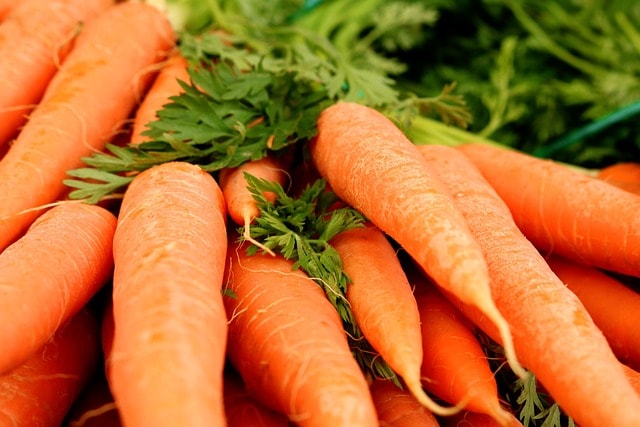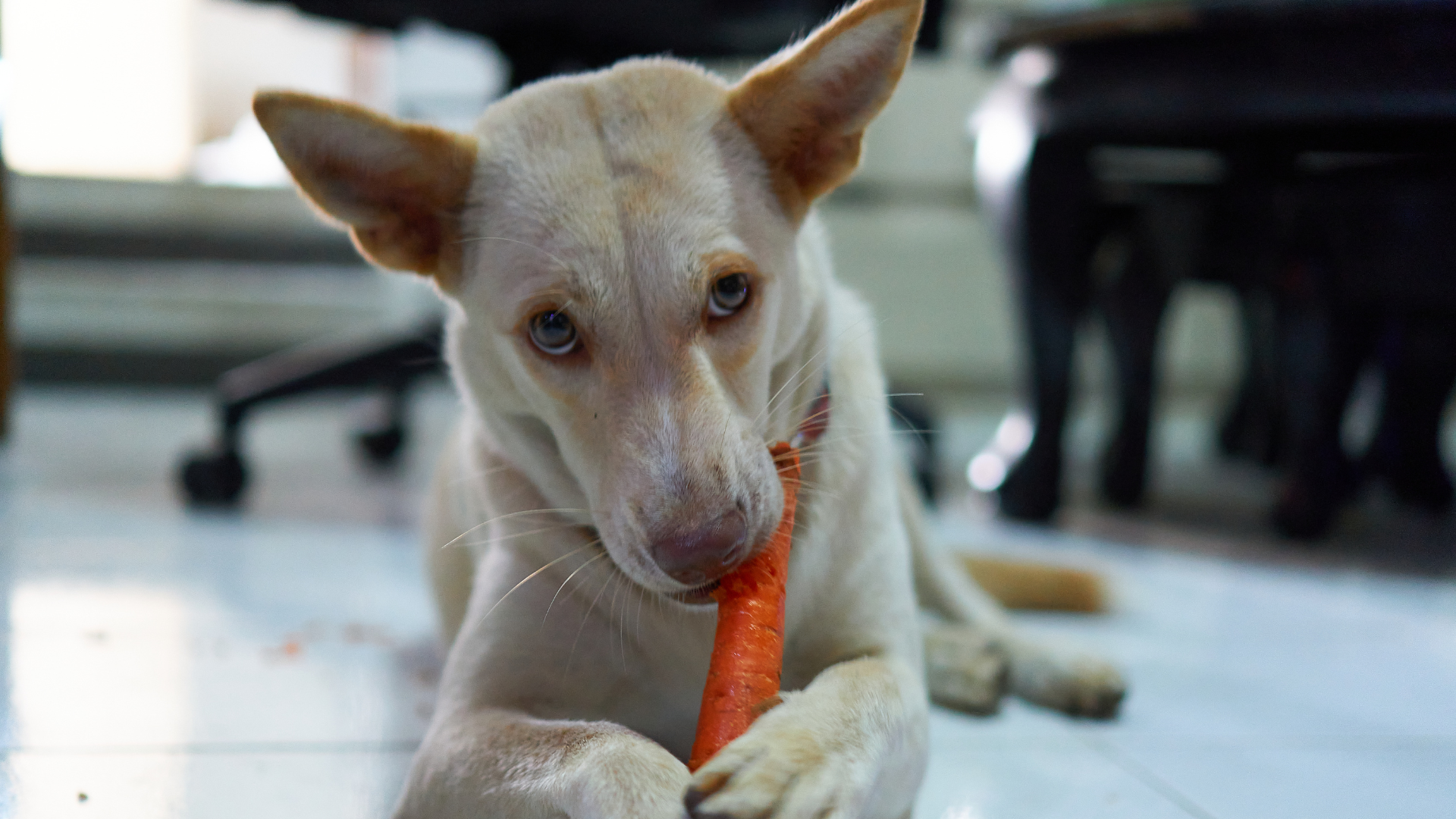Carrots for Dogs: Why They Are a Healthy Choice
Many dog lovers ask themselves: Can dogs eat carrots? The answer is clear: Yes, dogs can eat carrots, and for good reasons.
The orange root vegetable offers a variety of health benefits and can be a valuable addition to the menu. Whether raw, cooked or as part of high-quality dog food - carrots support your dog's well-being in many ways and provide an abundance of vitamins, minerals and fiber.

Carrots as a nutrient supplier for dogs
Carrots are characterized by their high content of important nutrients. Among other things, they contain beta-carotene, a precursor to vitamin A, which promotes your dog's eyesight, strengthens the immune system and ensures healthy skin and a shiny coat. In addition, carrots provide vitamin B6 ( B vitamins for your dog ), which is essential for a functioning metabolism, and vitamin E, which acts as an antioxidant and contributes to cell health.
In addition to vitamins, carrots also contain valuable minerals that have a positive effect on your dog's health. Particularly noteworthy is the amount of potassium, which plays an important role in the body's water balance.
The vegetable also contains fiber, which supports healthy intestinal activity and contributes to general digestive health. Due to the high water content of the carrot, your dog takes in an extra portion of liquid with every bite, which can have a positive effect, especially on warm days.
Carrots are also able to bind toxins in the gastrointestinal tract and thus help regulate digestion.
Carrots as a natural aid for digestive problems
A particular benefit of carrots is their positive effect on the gastrointestinal tract. Dogs suffering from digestive problems or a sensitive stomach can benefit from the bland qualities of carrots.
Due to its high pectin content, it helps regulate the digestive tract and can have a balancing effect on both diarrhea and constipation. This makes it an ideal ingredient for dogs who tend to have sensitive digestion or who need to be gently reintroduced to solid food after an illness.
Moro's carrot soup, which was originally developed to treat diarrhea in humans, has proven particularly effective. Cooking the carrots for a long time creates special sugar molecules that help bind and excrete harmful bacteria in the intestines. This effect can also be observed in dogs and makes carrots a natural aid for gastrointestinal problems.
Carrots can also be used as a natural stomach soother in general dog food. Their gentle effect on the intestinal flora makes them a valuable ingredient in dog food, contributing to stable digestion in the long term.
They can also help firm up your dog's stool, which is especially helpful after episodes of diarrhea.
The right amount of carrots for your dog
Although carrots, often called carrots, are healthy, they should be fed in the right amount. Individual tolerance can vary from dog to dog, and excessive consumption can in some cases lead to flatulence or soft stools. A moderate number of carrots in the daily diet is therefore ideal.
Small dogs can usually easily enjoy one small carrot per day, while medium to large dogs can eat a little more.
If your dog is trying carrots for the first time, you should introduce them slowly and observe how they react. A slow introduction will prevent digestive problems and ensure that your dog tolerates the carrots well. If your four-legged friend doesn't like carrots right from the start, you can mix them into their usual food to get them used to the new taste. Alternatively, you can cut them into small pieces or puree them so that they are easier to digest.
Carrots as a healthy snack and tooth cleaner for dogs
Many dog owners are looking for healthy alternatives to traditional treats. Carrots are an excellent natural snack between meals, as they are low in calories and their crunchy bite provides excellent dental care. Young dogs who are teething in particular benefit from the firm consistency of carrots, as chewing massages the gums and helps to remove loose milk teeth naturally.
Adult dogs can also benefit from this effect, as chewing on a raw carrot helps clean teeth by naturally rubbing away plaque, which can reduce the risk of tartar and bad breath.
Another benefit: Carrots contain no added sugar or artificial additives found in many commercial treats, making them an excellent choice for dogs with sensitive digestion or a tendency to gain weight.

The root vegetable carrot in dog food
In addition to fresh carrots, there are numerous ways to incorporate the healthy root vegetable into your four-legged friend's diet. Many high-quality dog foods already contain carrots as a natural ingredient, as they are not only healthy, but also have a pleasant taste that many dogs love.
Carrots are also available in the form of dried flakes, which can simply be soaked in water and mixed into the usual food. This option is particularly practical for dog owners who value a natural diet but do not always have fresh carrots on hand.
If you order carrot products for your dog online, make sure you get a quick delivery time and high-quality ingredients. Also make sure that there are no unnecessary additives in order to best support your dog's health.
Conclusion: Carrots as a valuable addition to dog nutrition
Carrots are an excellent addition to your dog's diet. They provide valuable vitamins, support digestion and are a healthy snack between meals.
Whether as a raw piece to nibble on, as part of the food or as practical flakes - carrots are versatile and contribute to the health of your four-legged friend. As long as you make sure to feed the right amount and slowly get your dog used to the vegetable, you can give him a natural and nutritious treat with carrots.
Especially for dogs with gastrointestinal problems or as a healthy addition to daily feeding, carrots offer a wealth of benefits that make them an indispensable part of your pet's diet.






